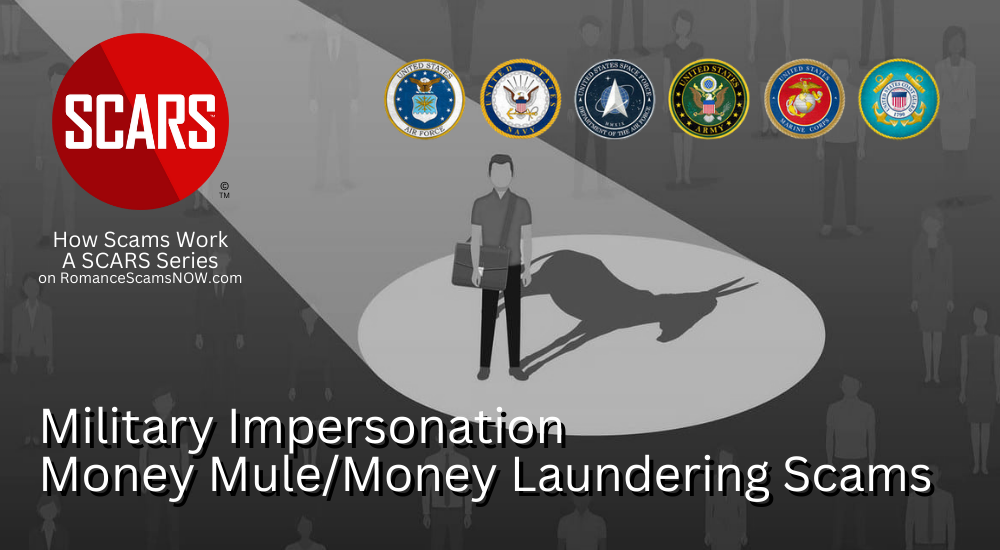
SCARS Institute’s Encyclopedia of Scams™ Published Continuously for 25 Years

Author:
• Tim McGuinness, Ph.D., DFin, MCPO, MAnth – Anthropologist, Scientist, Director of the Society of Citizens Against Relationship Scams Inc.
Article Abstract
Scammers are increasingly exploiting trust by impersonating military personnel, luring victims into a variety of scams, including romance scams and financial fraud. However, a troubling new twist has emerged: scammers offering victims purported military employment, promising lucrative salaries and allowing victims to keep a portion of the funds sent to them.
This scheme involves victims unwittingly becoming money mules and being paid a commission or salary, facilitating money laundering and exposing themselves to legal repercussions. Victims of these scams face devastating financial and emotional consequences, compounded by the risk of prosecution.
To combat these scams, individuals must exercise vigilance and skepticism online, verifying the legitimacy of offers and refraining from divulging personal information or engaging in financial transactions. Additionally, verifying military service claims with relevant U.S. Military law enforcement agencies is a critical step to avoid falling victim to impersonation scams.

The Exploitation of Trust: Scammers Targeting Scam Victims with Military Impersonation Scam Tactics to Convert them into Money Mules
One of the favorite scam types that scammers use is Military Impersonation. However, a new variation of the fake soldier scam has emerged that facilitates money movement and places the victims in legal jeopardy.
Of course, we all know of scammers impersonating members of the military to lure unsuspecting victims into various scams, ranging from romance scams to financial fraud, a new approach can be especially problematic for scam victims. This new and disturbing evolution that has emerged recently has scammers enticing individuals with promises of employment from the military, offering lucrative salaries based on commission, letting scam victims keep a portion of the funds that the ‘military’ sends to them.
There is one big problem with this, not only is it a scam but it puts the victim in a position to profit from the funds that the criminals are sending through the victim making them a willing money mule and subject to prosecution.
Fake Soldier Scams
As awareness of traditional military romance scams has increased, scammers have adapted their tactics to ensnare victims through alternative means. In this new approach, some perpetrators now claim to offer employment opportunities for the military to their victims, enticing individuals with promises of lucrative revenues or as a means of paying the victims back for the money they have previously given. These fraudulent job offers involve positions that require no qualifications or prior experience, the victim just has to move amounts of money and keep a percentage for themselves.
Unbeknownst to the victim, these transactions are part of an elaborate money laundering scheme orchestrated by the scammers. The funds transferred to the victim’s account are stolen from other scam victims or obtained through other illicit means, and the victim unwittingly becomes a pawn in the criminal enterprise and is subject to prosecution because of it. By redirecting the funds to themselves, the victim unknowingly facilitates the laundering of money, shielding the true origins of the illicit proceeds and complicating law enforcement efforts to apprehend the perpetrators. But because of their ‘profit’ or percentage that they keep they become a full accomplice.
The consequences of falling victim to these military impersonation money movement scams can be devastating, both financially, emotionally, and legally. Many victims experience profound feelings of betrayal and shame upon discovering the true nature of the scam, compounded by the loss of their own hard-earned savings or accumulated debt resulting from fraudulent transactions, but worse still is the high probability that they can face prosecution unless they act quickly to report the crimes.
Reminder
Cybercriminals frequently impersonate U.S. military member identities to gain the trust and confidence of their victims. Once such confidence is gained, cybercriminals increase their chances of successfully defrauding victims due to the added emotional connection and patriotism that is often elicited. These types of scams are commonly referred to as “trust-based relationship scams,” including so-called Romance scams, Investment scams, and Money Movement/Money Laundering in which the criminal uses falsified identities to initiate the trust relationships. To facilitate these types of scams, cybercriminals often impersonate U.S. military members.
To Avoid This Scams
To combat these military impersonation money movement scams, victims need to be especially careful about anyone online offering employment that involves poorly defined jobs that just involve the movement of money.
As with avoiding all scams, vigilance and skepticism are paramount when engaging in online interactions, particularly with individuals claiming affiliation with the military or offering employment opportunities. Verifying the legitimacy of individuals and organizations through independent research and corroborating information from trusted sources can help mitigate the risk of falling victim to fraudulent schemes. Furthermore, exercising caution when divulging personal information or engaging in financial transactions online can prevent exploitation by malicious actors seeking to exploit trust for nefarious purposes.
How to Verify if Someone is Serving in the United States Military
Anyone is the United States Military Services will have records that can be verified. However, for the average person that is not an easy process. Therefore we recommend that anyone who wants to verify someone claiming to be active military, especially stations in other countries should contact the various law enforcement agencies within the military.
U.S. military law enforcement are both very aware of these impersonation scams and can confirm if the information a victim receives is valid or not. Contact the agency for the branch of service you want to verify.
When you contact them, we recommend that you call – do not just send email.
U.S. Army
Anyone claiming to be in the U.S. Army will have records that can be verified by Army CID (Criminal Investigation Division)
Click here to find the U.S. Army CID offices and contact information.
U.S. Navy & Marine Corps
Anyone claiming to be in the U.S. Navy will have records that can be verified by Navy NCIS (Naval Criminal Investigative Service)
Click here to find the U.S. Navy NCIS offices and contact information.
U.S. Air Force & Space Force
Anyone claiming to be in the U.S. Air Force will have records that can be verified by Air Force OSI (Office of Special Investigations)
Click here to find the U.S. Air Force OSI contact information.
U.S. Coast Guard
Anyone claiming to be in the U.S. Coast Guard will have records that can be verified by Coast Guard CGIS (Coast Guard Investigative Service)
Click here to find the U.S. Coast Guard CGIS contact information.
More About Military Impersonation Scams:
- Military Impersonation Scams – Article Catalog
- Money Mules – Article Catalog 2023/2024 (romancescamsnow.com)
- SCARS Webinar: Romance Scams #1 – Pig Butchering Fraud & Military Impersonation Fraud [VIDEO]
- United States Military ID Cards: How To Spot Fakes
- U.S. Department of Defense Military Social Media Use Policy: 2022
-/ 30 /-
What do you think about this?
Please share your thoughts in a comment below!
Table of Contents
- Scammers are Using the Lure of Being Repaid and Commissions to Hook More Money Mules to do their Money Laundering for Them!
- Article Abstract
- The Exploitation of Trust: Scammers Targeting Scam Victims with Military Impersonation Scam Tactics to Convert them into Money Mules
- Fake Soldier Scams
- Reminder
- To Avoid This Scams
- How to Verify if Someone is Serving in the United States Military
- U.S. Army
- U.S. Navy & Marine Corps
- U.S. Air Force & Space Force
- U.S. Coast Guard
- More About Military Impersonation Scams:
LEAVE A COMMENT?
Recent Comments
On Other Articles
- Arwyn Lautenschlager on Love Bombing And How Romance Scam Victims Are Forced To Feel: “I was love bombed to the point that I would do just about anything for the scammer(s). I was told…” Feb 11, 14:24
- on Dani Daniels (Kira Lee Orsag): Another Scammer’s Favorite: “You provide a valuable service! I wish more people knew about it!” Feb 10, 15:05
- on Danielle Delaunay/Danielle Genevieve – Stolen Identity/Stolen Photos – Impersonation Victim UPDATED 2024: “We highly recommend that you simply turn away form the scam and scammers, and focus on the development of a…” Feb 4, 19:47
- on The Art Of Deception: The Fundamental Principals Of Successful Deceptions – 2024: “I experienced many of the deceptive tactics that romance scammers use. I was told various stories of hardship and why…” Feb 4, 15:27
- on Danielle Delaunay/Danielle Genevieve – Stolen Identity/Stolen Photos – Impersonation Victim UPDATED 2024: “Yes, I’m in that exact situation also. “Danielle” has seriously scammed me for 3 years now. “She” (he) doesn’t know…” Feb 4, 14:58
- on An Essay on Justice and Money Recovery – 2026: “you are so right I accidentally clicked on online justice I signed an agreement for 12k upfront but cd only…” Feb 3, 08:16
- on The SCARS Institute Top 50 Celebrity Impersonation Scams – 2025: “Quora has had visits from scammers pretending to be Keanu Reeves and Paul McCartney in 2025 and 2026.” Jan 27, 17:45
- on Scam Victims Should Limit Their Exposure To Scam News & Scammer Photos: “I used to look at scammers photos all the time; however, I don’t feel the need to do it anymore.…” Jan 26, 23:19
- on After A Scam, No One Can Tell You How You Will React: “This article was very informative, my scams happened 5 years ago; however, l do remember several of those emotions and/or…” Jan 23, 17:17
- on Situational Awareness and How Trauma Makes Scam Victims Less Safe – 2024: “I need to be more observant and I am practicing situational awareness. I’m saving this article to remind me of…” Jan 21, 22:55
ARTICLE META
Important Information for New Scam Victims
- Please visit www.ScamVictimsSupport.org – a SCARS Website for New Scam Victims & Sextortion Victims
- Enroll in FREE SCARS Scam Survivor’s School now at www.SCARSeducation.org
- Please visit www.ScamPsychology.org – to more fully understand the psychological concepts involved in scams and scam victim recovery
If you are looking for local trauma counselors please visit counseling.AgainstScams.org or join SCARS for our counseling/therapy benefit: membership.AgainstScams.org
If you need to speak with someone now, you can dial 988 or find phone numbers for crisis hotlines all around the world here: www.opencounseling.com/suicide-hotlines
A Note About Labeling!
We often use the term ‘scam victim’ in our articles, but this is a convenience to help those searching for information in search engines like Google. It is just a convenience and has no deeper meaning. If you have come through such an experience, YOU are a Survivor! It was not your fault. You are not alone! Axios!
A Question of Trust
At the SCARS Institute, we invite you to do your own research on the topics we speak about and publish, Our team investigates the subject being discussed, especially when it comes to understanding the scam victims-survivors experience. You can do Google searches but in many cases, you will have to wade through scientific papers and studies. However, remember that biases and perspectives matter and influence the outcome. Regardless, we encourage you to explore these topics as thoroughly as you can for your own awareness.
Statement About Victim Blaming
SCARS Institute articles examine different aspects of the scam victim experience, as well as those who may have been secondary victims. This work focuses on understanding victimization through the science of victimology, including common psychological and behavioral responses. The purpose is to help victims and survivors understand why these crimes occurred, reduce shame and self-blame, strengthen recovery programs and victim opportunities, and lower the risk of future victimization.
At times, these discussions may sound uncomfortable, overwhelming, or may be mistaken for blame. They are not. Scam victims are never blamed. Our goal is to explain the mechanisms of deception and the human responses that scammers exploit, and the processes that occur after the scam ends, so victims can better understand what happened to them and why it felt convincing at the time, and what the path looks like going forward.
Articles that address the psychology, neurology, physiology, and other characteristics of scams and the victim experience recognize that all people share cognitive and emotional traits that can be manipulated under the right conditions. These characteristics are not flaws. They are normal human functions that criminals deliberately exploit. Victims typically have little awareness of these mechanisms while a scam is unfolding and a very limited ability to control them. Awareness often comes only after the harm has occurred.
By explaining these processes, these articles help victims make sense of their experiences, understand common post-scam reactions, and identify ways to protect themselves moving forward. This knowledge supports recovery by replacing confusion and self-blame with clarity, context, and self-compassion.
Additional educational material on these topics is available at ScamPsychology.org – ScamsNOW.com and other SCARS Institute websites.
Psychology Disclaimer:
All articles about psychology and the human brain on this website are for information & education only
The information provided in this article is intended for educational and self-help purposes only and should not be construed as a substitute for professional therapy or counseling.
While any self-help techniques outlined herein may be beneficial for scam victims seeking to recover from their experience and move towards recovery, it is important to consult with a qualified mental health professional before initiating any course of action. Each individual’s experience and needs are unique, and what works for one person may not be suitable for another.
Additionally, any approach may not be appropriate for individuals with certain pre-existing mental health conditions or trauma histories. It is advisable to seek guidance from a licensed therapist or counselor who can provide personalized support, guidance, and treatment tailored to your specific needs.
If you are experiencing significant distress or emotional difficulties related to a scam or other traumatic event, please consult your doctor or mental health provider for appropriate care and support.
Also read our SCARS Institute Statement about Professional Care for Scam Victims – click here to go to our ScamsNOW.com website.
















Thank you for your comment. You may receive an email to follow up. We never share your data with marketers.